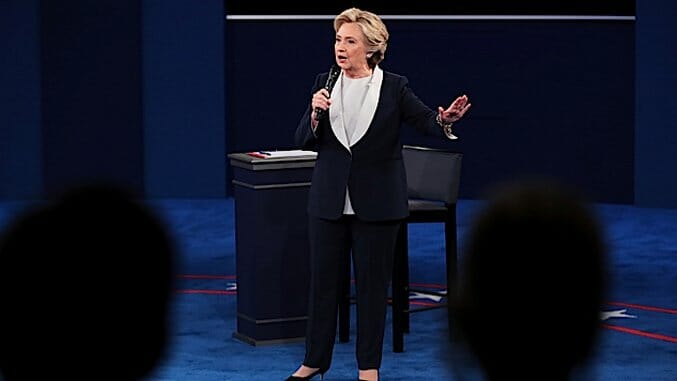The Second Presidential Debate: In Praise of Well-Prepared Women
Photo by Scott Olson/Getty
It was not yet midnight in St. Louis when Fox News Channel’s Megyn Kelly returned the conversation to a subject she knows well: Republican nominee Donald Trump’s repugnant treatment of women. As one of three moderators of the GOP’s first primary debate, some 14 months ago, she’d challenged the reality TV star to account for his remarks, and on Sunday night she came, as they say, with receipts. Kelly is not always the hardest-hitting of cable news anchors, but she ably contextualized Trump’s repeated claim that the 2005 videotape in which he’s heard bragging about using his celebrity status to sexually assault women—”Grab them by the pussy,” in his now-infamous phrasing—was mere “locker room talk.”
His response to her question last August, which later prompted him to say that “You could see… blood coming out of [Kelly’s] whatever,” of course suggested otherwise, and Kelly played it back in full: His glib dismissal of the criticism, including a joke at Rosie O’Donnell’s expense; the Republican crowd’s effusive cheers; his argument that the condemnation of such comments amounts to mere “political correctness.” “It’s been really remarkable to see what the women issue has done to Trump,” Kelly concluded, and it was well-prepared women who won the debate in a walk.
In a campaign already defined by the gender divide—the first woman to be nominated by a major party in the history of the United States facing off against one of the country’s most consistent and well-know misogynists; the overwhelming advantage Democrat Hillary Clinton has amassed over Trump with women voters—the 48 hours since the release of Trump’s sickening conversation with then-”Access Hollywood” host Billy Bush has been both dismaying and clarifying. Even among the GOP officials rescinding their endorsements of Trump, the phrase “as a husband and father” recurred with clockwork precision, as if to offer a reminder that Republicans’ interest in women’s rights goes no further than blood ties.
It was clear from the outset that these efforts to create distance from Trump were pure political calculation, as was the refusal of Paul Ryan, Mitch McConnell, Marco Rubio, and other party luminaries to withdraw their support. In any case, the attempt to amputate the gangrenous limb failed: Trump might be the blackest mark on the GOP’s reputation since Barry Goldwater, but the hatred at the heart of his campaign has been circulating in the party’s bloodstream for years.
-

-

-

-

-

-

-

-

-

-

-

-

-

-

-

-

-

-

-

-

-

-

-

-

-

-

-

-

-

-

-

-

-

-

-

-

-

-

-

-








































